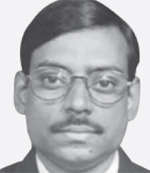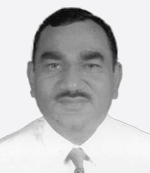Geospatial for sustainable water management
Speakers and Presentations

PROF AK GOSAIN
Department of Civil Engineering
Indian Institute of Technology Delhi

Joginder Singh
Advisor
National Water Mission
Presentation on:Availability of Water and Future Demand

Vijay Kumar
Vice President and Head Technology
Esri IndiaPresentation on:Water Resources Challenges and Geospatial Technology

Dr Ajay Pradhan
President, C2S2
Presentation on:Technological Challenges and Opportunities in addressing Sustainable Water for Smart Cities

SK SINHA
Technical Advisor
Central Ground Water Board

DP Mathuria
Director
Central Water Commission
Presentation on:Web Enabled Water Resources Information System for India

Aidan Mercer
Sr. Industry Marketing
Manager, Government & Water Utilities Bentley Systems, UK
Presentation on:Advancements in Modeling and Analytics for Smarter Water Networks

Dr Vinay Sinha
Associate Prof
TERI University
Presentation on:Digital Water Resources in India using Geospatial Technologies

Bhimrao Kachru Sawai
Project Director
Water & Sanitation Support Organisation
Presentation on:Water Management and Reforms Project Maharashtra Sujal Nirmal Abhiyan (MSNA)

Abdul Hakim
Sci/Engr.'SG'
National Remote Sensing Centre

Balaji Nagarajan
Director & CEO
GeoKno

Aswini Kumar Das
Associate Project Manager Telangana State Remote Sensing Appl. Centre

Dr Vivek Kale
Head – Geospatial
Kalyani Global Engineering
Presentation on:Relevance of geospatial attributes in the Water database : a critique

NC Jain
Director – Technical
National Water Development Agency
Presentation on:Interlinking of Rivers in India - Use of GIS, Remote Sensing and Spatial Planning
Introduction: Indian economy & water challenges
Water is the most precious natural resources for planet earth, essential for human civilisation, living organisms and natural habitats, with indispensible use in agricultural, industrial, household, recreational and environmental activities.
India has more than 18 % of the world’s population, but has only 4% of world’s renewable water resources and 2.4% of world’s land area. There are further limits on utilizable quantities of water owing to uneven distribution over time and space. The threat of water stress is looming large for India as growing population and rapid urbanisation puts severe demand on the fragile and finite water resources which are increasingly getting stressed and depleted and groundwater levels reaching critical levels.
As the Indian economy grows, water scarcity is shadowing the country’s ambitions for growth and prosperity. Water scarcity may impede growth; create food shortages and increase reliance on external supplies; exacerbate regional conflicts; and lead to other fundamental problems for society. Integrated water management is therefore vital for poverty alleviation, environmental sustenance and sustainable economic development.
The water sector in India is encountering a series of challenges, including a growing demand-supply gap, deteriorating water quality, fragmented water governance, and the difficulties of balancing the water-food-energy nexus. At the same time, climate change is likely to compound the problems of scarcity. Solutions to these challenges lie both in increasing water supply through the development of infrastructure to store more water, as well as to adopt management measures to increase water productivity for agricultural and industrial uses through improvements in efficiencies and increasing agricultural productivity.
The geospatial solutions
Integrated water management, or coordinated development and management of water, land and related resources, is vital for poverty alleviation, environmental sustenance and sustainable economic development. Geospatial technology has been demonstrating its effectiveness in water management as it creates the possibility for spatial identification of water sources, major problems and a more objective definition of priority actions.
In order to optimally utilize sparse water resources, accurate information about natural resources is the most basic and critical requirement. Data/information is needed on parameters such as Rainfall, Availability of surface water resources, Groundwater resources, Landuse-land cover maps, Elevations, slopes, Land surface temperatures, evapo-transpiration, Biomass etc. Not only information is needed, tools are required to properly analyze such information for planning purposes. It is here that geospatial information and technology, such as remote sensing, visualisation, GIS, Lidar, UAVS can play a crucial role.
GIS and remote sensing provide important information for the research, modelling, simulation, and engineering of such major projects. Some such projects are
- National Water Policy
- River Linking Project
- National Mission for Clean Ganga / Ganga Rejuvanation
- Ground water modelling
- Hydrological data management
- Various water resource management projects across the country being implemented by departments and agencies of the Ministry.
Understanding the increasingly critical need for effective water resource management and the role of geospatial technology in achieving these objectives, Geospatial Media & Communications is organising the seminar “Geospatial for Sustainable Water Management,” during GeoSmart India 2016, March 1-3, 2016.
Programme objectives
-
Knowledge Exchange: Bring together the diverse stakeholders of water resource management in the country to facilitate exchange of knowledge, technology and ideas on role of geospatial technology in effective and efficient water resource management and creating the most conducive environment for technology uptake and transfer
-
Technology Transfer: Present the diverse applications of geospatial technology through presentations by technology leaders and experts and how it can contribute to sustainable water resource management in the country
-
Best Practices: Showcase best practices of technology use through case studies by user departments
-
Deliberations: Bring out user challenges and draw out possible solutions
Programme Agenda
The seminar will feature three sessions:
Session1: Leveraging geospatial technologies for ensuring water security
The government is taking a number of initiatives towards effectively harnessing water resources for addressing water security. This session will look at key central and state programmes, and the role and relevance of geospatial technologies in these programmes and establishing a framework to maximise uptake of the technology.
Session 2: Geo-ICT solutions for water management
The evolution in geospatial technologies is ensuring that the technology is able to address diverse issues and applications pertaining to water availability, distribution and management. This session will explore the numerous geospatial solutions for effective water management.
Session 3: Taking a lead with geospatial
This session will present case studies from various water departments and organisations on successful implementation of geospatial technologies and the benefits accrued.